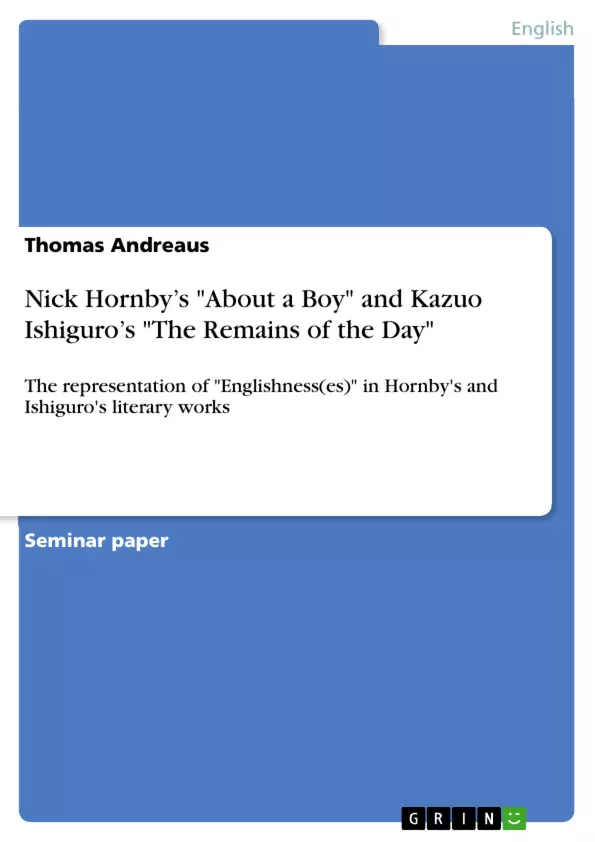The paper focuses mainly on the representation of "Englishness(es)" in Hornby's and Ishiguro's literary works.
Inhaltsverzeichnis (Table of Contents)
- ‘Englishness' in Kazuo Ishiguro's The Remains of the Day
- Stevens, the English butler
- The English countryside
- English butlers and Dignity
- Lord Darlington
- Englishness and Americans
- Englishness vs. Japaneseness
- 'Englishness' in Nick Hornby's About a Boy
- Cambridge and London
- "The Lonely Londoners": Isolation and alienation
- 'Englishnesses'
Zielsetzung und Themenschwerpunkte (Objectives and Key Themes)
This text examines the concept of "Englishness" through the lens of two prominent contemporary British novels, Kazuo Ishiguro's *The Remains of the Day* and Nick Hornby's *About a Boy*. The text explores the complexities of national identity, particularly the role of class, social expectations, and cultural values in shaping perceptions of Englishness. * **The multifaceted nature of Englishness:** The text argues that "Englishness" is a multifaceted concept with a variety of overlapping myths and images. * **The impact of class and social expectations:** The text explores how class and social expectations influence the characters' understanding and enactment of Englishness. * **The role of cultural values in shaping national identity:** The text highlights the influence of traditional cultural values, such as dignity, restraint, and deference, on the characters' perceptions of Englishness. * **The intersection of national identity and personal experience:** The text examines how the characters' personal experiences, including their social backgrounds, relationships, and individual desires, shape their understanding of Englishness. * **The complexities of post-colonial identities:** The text discusses the unique perspective of Kazuo Ishiguro, a post-colonial writer who navigates the complexities of English and Japanese identities in his work.Zusammenfassung der Kapitel (Chapter Summaries)
‘Englishness' in Kazuo Ishiguro's The Remains of the Day
This chapter analyzes how Kazuo Ishiguro explores the concept of "Englishness" through the character of Stevens, a quintessential English butler. Stevens embodies a strict sense of class, dedication to his work, and a romanticized view of English tradition. The chapter examines Stevens's journey through the English countryside, his adherence to the ideals of the fictional "Hayes Society," and his dedication to maintaining dignity at the expense of personal life. It also explores Lord Darlington's role in shaping Stevens's understanding of Englishness and the complexities of his political affiliations. The chapter concludes by comparing Stevens's perspective on Englishness to that of American characters in the novel, highlighting the contrasting cultural perspectives.
'Englishness' in Nick Hornby's About a Boy
This chapter examines how Nick Hornby uses the setting of Cambridge and London to explore different facets of "Englishness" in *About a Boy*. The chapter delves into the themes of isolation and alienation in the novel, highlighting the "Lonely Londoners" and their struggles with finding connection. The chapter also analyzes how the novel presents various "Englishnesses" based on social class, individual experiences, and cultural perspectives, showcasing the diverse and often contradictory nature of national identity.
Schlüsselwörter (Keywords)
This text focuses on the complex and multifaceted concept of "Englishness," examining its manifestation through individual characters, cultural values, and social expectations in two contemporary British novels. The text explores key themes of national identity, class, dignity, and the intersection of personal experience and cultural norms, with a particular focus on the post-colonial perspective of Kazuo Ishiguro. Central to the analysis are the characters of Stevens, Lord Darlington, and the "Lonely Londoners," as well as the settings of the English countryside and urban London. The text aims to provide a nuanced understanding of the construction of "Englishness" through the lens of literary analysis and cultural critique.Frequently Asked Questions
How is the concept of "Englishness" explored in these novels?
The text analyzes "Englishness" as a multifaceted concept shaped by class, social expectations, and cultural myths in the works of Ishiguro and Hornby.
What role does class play in Ishiguro’s "The Remains of the Day"?
Class is central to the identity of the protagonist Stevens, whose strict adherence to the role of a butler reflects traditional English values of dignity and restraint.
How does Nick Hornby depict urban Englishness in "About a Boy"?
Hornby uses the settings of London and Cambridge to explore themes of isolation, alienation, and diverse "Englishnesses" based on individual lifestyle and social background.
What is the significance of the post-colonial perspective in Ishiguro's work?
As a post-colonial writer, Ishiguro navigates the complexities of both English and Japanese identities, providing a unique outsider-insider view on national traditions.
How do "dignity" and "restraint" define the character of Stevens?
These values are the core of Stevens's professional philosophy, leading him to sacrifice his personal life and emotions to maintain an idealized version of English service.
- Quote paper
- Thomas Andreaus (Author), 2004, Nick Hornby’s "About a Boy" and Kazuo Ishiguro’s "The Remains of the Day", Munich, GRIN Verlag, https://www.grin.com/document/149861



